The Mystery of Reduced Urination in Early Pregnancy
Early pregnancy is a time filled with excitement and anticipation, but it can also bring about a range of symptoms that can be confusing and concerning. One such symptom that some women may experience is reduced urination. This article aims to unveil the mystery surrounding reduced urination in early pregnancy, exploring its causes, implications for maternal health, and tips for maintaining proper hydration during this critical period.
Understanding Early Pregnancy and Body Changes
During early pregnancy, a woman’s body undergoes significant changes as it adapts to support the developing fetus. The body starts producing more hormones, particularly human chorionic gonadotropin (hCG), which can affect various bodily functions, including urination. Understanding these changes can help in managing pregnancy concerns related to urination.
The Role of Hydration in Early Pregnancy
Hydration is crucial during pregnancy. Adequate fluid intake helps maintain healthy amniotic fluid levels, supports the increased blood volume, and assists in the efficient functioning of the kidneys. However, factors such as morning sickness, nausea, and dietary changes can impact a pregnant woman’s hydration levels, potentially leading to reduced urination.
Causes of Reduced Urination in Early Pregnancy
There are several reasons why reduced urination may occur in early pregnancy. Understanding these causes can provide insights into how to address this symptom effectively.
- Hormonal Changes: The surge in hormones like progesterone can affect bladder function and lead to changes in urination patterns.
- Dehydration: Morning sickness and changes in appetite may cause some women to drink less water, resulting in reduced urination.
- Increased Blood Volume: Early in pregnancy, the body increases blood volume, which can lead to temporary changes in kidney function and urination.
- Dietary Changes: Some women may unintentionally decrease their fluid intake due to dietary changes or nausea.
- Stress and Anxiety: Emotional factors can also influence bodily functions, including urination.
Identifying Symptoms Associated with Reduced Urination
While reduced urination can be a normal occurrence in early pregnancy, it is essential to monitor for other symptoms that may indicate a health concern. Some symptoms to watch for include:
- Dark yellow urine, indicating dehydration
- Urinary tract infections (UTIs), which may present with burning sensations or frequent urges
- Swelling in the extremities, which could be a sign of fluid retention
- Fatigue or dizziness, which may indicate dehydration or other health issues
Maintaining Hydration During Early Pregnancy
Proper hydration is key to ensuring maternal health during early pregnancy. Here are some tips to help maintain adequate fluid intake:
- Drink Water Regularly: Aim to drink at least 8-10 glasses of water daily, adjusting based on your activity level and climate.
- Include Hydrating Foods: Incorporate fruits and vegetables with high water content, such as cucumbers, watermelon, and oranges.
- Limit Caffeine and Sugary Beverages: These can lead to dehydration and should be consumed in moderation.
- Set Reminders: Use phone alarms or apps to remind you to drink water throughout the day.
- Listen to Your Body: Pay attention to signs of thirst and drink accordingly.
Step-by-Step Process to Monitor Hydration
Monitoring your hydration levels can help ensure that you remain healthy during early pregnancy. Follow these steps:
- Keep a Hydration Journal: Track your daily water intake and note any patterns related to reduced urination.
- Observe Urine Color: Light yellow urine indicates proper hydration, while dark yellow suggests a need for more fluids.
- Assess Your Symptoms: Note if you experience any symptoms such as dizziness, fatigue, or swelling.
- Consult a Healthcare Provider: If you have concerns about reduced urination or hydration, speak with your doctor.
Troubleshooting Tips for Reduced Urination
If you are experiencing reduced urination in early pregnancy, consider the following troubleshooting tips:
- Evaluate Your Fluid Intake: Ensure you are drinking enough water and consuming hydrating foods.
- Manage Morning Sickness: If nausea is affecting your ability to hydrate, try small, frequent sips of water or electrolyte drinks.
- Practice Relaxation Techniques: Stress management techniques such as deep breathing or prenatal yoga can help alleviate anxiety.
- Consult Your Doctor: If symptoms persist or worsen, seek professional advice to rule out any underlying issues.
When to Seek Medical Attention
While reduced urination can be a normal symptom of early pregnancy, certain scenarios warrant a visit to your healthcare provider:
- If you experience severe dehydration symptoms, such as extreme thirst, dry mouth, or confusion.
- Signs of a urinary tract infection, including pain during urination or frequent urges.
- Persistent swelling in your hands or feet without relief.
- Extreme fatigue or dizziness that interferes with daily activities.
Conclusion: Embracing Early Pregnancy with Confidence
Reduced urination in early pregnancy can be a perplexing symptom, but understanding the causes and maintaining proper hydration can significantly alleviate concerns. By staying informed about your body changes and health needs, you can navigate this exciting journey with confidence. Remember, maternal health is paramount, and keeping an open line of communication with your healthcare provider is essential for addressing any pregnancy concerns.
For more detailed information on pregnancy symptoms and health tips, explore our resources on maternal health. And for expert opinions and research on hydration during pregnancy, visit this external link.
This article is in the category Pregnancy and created by PregnancyBabyCare Team
